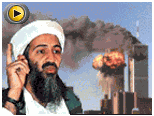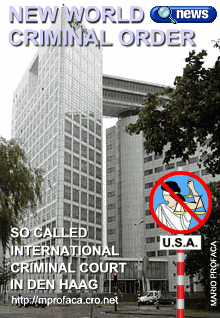
NEW WORLD CRIMINAL ORDER |
 |
Loading Latest Overseas Security News . . . Please wait . . .
| |
|
"Invade the Hague Act" The U.S. passed the American Servicemembers Protection Act, dubbed sarcastically in international circles as the "Invade the Hague Act."
The State Department is blackmailing no fewer than 35 other countries in Africa, Europe, Asia and Central and South America. The Globe & Mail [Canada], 18 September 2003 By Pauline Jelinek, Associated Press, (08/10/2002) By Pauline Jelinek, Associated Press, (09/10/2002) Countries are asked to join pacts against extradition of troops, By Christopher Marquis, NYT, (08/10/2002) Justwatch List (Justice Watch List) Justwatch List (Justice Watch List) By Elizabeth Becker, (09/10/2002) (The Netherlands) |
|
Times Online, June 03, 2002 THE United States must be prepared to take the War on Terror to up to 60 countries if weapons of mass destruction are to be kept out of terrorists' hands, President Bush said at the weekend.  His impassioned speech to 1,000 graduates of West Point Military Academy in New York State on Saturday marks a watershed in the Administration's foreign policy.
His impassioned speech to 1,000 graduates of West Point Military Academy in New York State on Saturday marks a watershed in the Administration's foreign policy. Mr Bush said that terrorism cells in countries that make up close to one third of the globe must be actively sought and dismantled. "We must take that battle to the enemy, disrupt his plans and confront the worst threats before they emerge," he said, adding that Americans must be "ready for pre-emptive action when necessary to defend our liberty and to defend our lives". He said: "In the world we have entered, the only path to safety is the path of action. And this nation will act." The 52-minute speech also contained a series of thinly veiled attacks on countries already singled out as enemies of the US. Mr Bush did not mention any country by name, but he pointed repeatedly to non-democratic regimes that are said to sponsor terrorism. In what officials later hinted was a reference to President Saddam Hussein's regime in Iraq, Mr Bush said that attempts to contain terrorist activity and anti-US sentiments within some countries would fail without direct action. "(Containment) is not possible when unbalanced dictators with weapons of mass destruction can deliver those weapons on missiles or can provide them to terrorist allies," he said. The criticism of foreign countries appeared to go further than any other he has made since September 11. "Some nations need military training to fight terror and we will provide it," Mr Bush said. "Other nations oppose terror but tolerate the hatred that leads to terror and that must change." White House officials told The Washington Post that these comments were directed at Middle East allies such as Saudi Arabia and Jordan. If the United States decides to make surprise strikes on other countries, it will mark a big change in strategy for the US military, which traditionally acts only in self-defence. The criticism of foreign countries appeared to go further than any other he has made since September 11. "Some nations need military training to fight terror and we will provide it," Mr Bush said. "Other nations oppose terror but tolerate the hatred that leads to terror and that must change." White House officials told The Washington Post that these comments were directed at Middle East allies such as Saudi Arabia and Jordan. If the United States decides to make surprise strikes on other countries, it will mark a big change in strategy for the US military, which traditionally acts only in self-defence. The speech was billed by the White House as the first instalment of a renewed "overall security framework". The framework will be expanded in a national security strategy document expected in July. Mr Bush said that America's foreign policy would have three strands. "We will defend the peace against threats from terrorists and tyrants. We will preserve the peace by building good relations among the great powers. And will we will extend the peace by encouraging free and open societies on every continent." He said that the conflict the graduates would be required to fight would differ greatly from that fought by their forefathers in Japan and Europe. "Enemies in the past needed great armies and great industrial capabilities to endanger the American people and our nation," Mr Bush said. "The attacks of September 11 required a few hundred thousand dollars in the hands of a few dozen evil and deluded men. All of the chaos and suffering they caused came at much less than the cost of a single tank." Abdul Rahman Yassin, one of the men accused of bombing the World Trade Centre in 1993, planned to attack New York's biggest Jewish districts, but his cohorts decided that more Jews would be killed if the Twin Towers were destroyed, according to CBS news. The station said that the bomber had told them that he was talked into the attack as revenge for "my Palestinian brothers and my brothers in Saudi Arabia". |
|
WHO GAVE THE GREEN LIGHT? |  |
 Another web site maintained by Mario Profaca: |
|
|
|
Defense Information Intelligence Threat Handbook |
Threat of Intl. Terrorism Against Terrorists America Responds |

By Mario Profaca At first we have had World War I, then World War II, and now we stop counting; There is not going to be a World War III at all! Cold-blooded Permanent World War - PWW (my own acronym) started. Paradoxicaly, the most scary thing about this world war is that it might be the last one, because "permanent" means "never ending" one. Acording to President Bush's thesis we are in a permanent war and so there is no peace to talk about at all. "Let's ask our leaders not to weaken their stand against war, but to tell us what more can be done for permanent peace." Eleanor Roosevelt wrote in her "My Day" newspaper column when Nazi Germany's Adolf Hitler was on the march in 1939. Critics called her America's No. 1 pacifist, but when she saw that war could not be avoided, she became a "realistic pacifist" and enthusiastically supported the war effort including her husband's (Franklin D. Roosevelt she married a on March 17, 1905) concentration camps: On February 19, 1942, at the height of U.S. involvement in World War II, President Roosevelt authorized military leaders within the War Department to place all Japanese Americans residing on the West Coast in detention camps. During the spring and summer of 1942, the United States Government carried out one of the largest "controlled migrations in history" (Syntagm "ethnic cleansing" was invented by Western diplomats 50 years later, referring to war crimes during the war in Bosnia and Herzegovina and in Croatia). This was the movement of 110,000 people of Japanese descent from their homes in an area bordering the Pacific coast into 10 wartime communities constructed in remote areas between the Sierra Nevada Mountains and the Mississippi River. Among 120,000 "relocated" Japanese Americans "whose skull pattern being less developed than that of the Caucasians, might be responsible for their aggressive behavior." [1] 77,000 were official American citizens. Although the order was employed only against Japanese Americans, it actually empowered the War Department to evacuate and imprison any American citizen without the time-honored right to a fair trial. These two factors - the harsh treatment of Japanese Americans (many of whom were fourth-generation citizens), and the power of the Army to imprison without trial any American citizen - constituted a fundamental challenge to the tradition of civil liberties long viewed as fundamental to America's democratic system.  In 2002 the US has failed to observe any international norms regarding the prisoners at Guantanamo bay, and gradually the international community is trying to take action against this abuse of prevailing international law - 24 Kuwaiti families are trying to sue the US government for denying its citizens at Guantanamo Bay the basic rights under international law which even the Nazis were provided at Nuremberg and which Milosevic is being given presently at The Hague.
In 2002 the US has failed to observe any international norms regarding the prisoners at Guantanamo bay, and gradually the international community is trying to take action against this abuse of prevailing international law - 24 Kuwaiti families are trying to sue the US government for denying its citizens at Guantanamo Bay the basic rights under international law which even the Nazis were provided at Nuremberg and which Milosevic is being given presently at The Hague.
Civil rights are now clearly being ignored by U.S. government agents in the war on terrorism who want to make the vulnerable detainees talk. The agents' methods of extracting information are not disclosed. And the imprisoned suspects and material witnesses cannot get in touch with lawyers or their families. The president made the arbitrary decision to designate as a foreign "enemy combatant" the Brooklyn-born Jose Padilla, who is suspected of being an al-Qaida scout seeking to locate targets for a "dirty bomb" attack. He is being held incommunicado in a military brig without due process of law and without being charged. Where are the great constitutional law experts who might protest such treatment? It appears they have bowed to the exigencies of our time and are accepting Bush's end-runs around the law involving some 2,400 detainees, who are reportedly being held indefinitely by U.S. authorities. [5]
The US civil rights groups are by and large maintaining either a total silence or a muted response. The result is that Muslims, especially Arabs and Pakistanis are being targeted for abuse and even murder - and children are not exempt either. Detention of these people without provision of the basics of legal counsel and so on is becoming part of the US domestic practice. Returning detainees have their own tales of horror while many who remain behind live in fear. Equally blatant examples of Bush's arrogance of power are in his foreign policy. What right does he have to tell Yasser Arafat that he has to go or to tell the Palestinians they cannot vote for Arafat in coming elections? When did the United States get the right to tell other countries and people who should lead them? [5] Bush's speech at the US Military Academy at West Point (New York state) could have been written by Israeli Prime Minister Ariel Sharon. In fact, Israel has adopted the preemption doctrine even more extensively than the US itself presently. Hence, we are seeing Israeli forces simply destroy Palestinian buildings with people in them on the pretext that these people are "terrorists". And not a word of condemnation from the US. Even the Europeans, who do not go along with Mr Bush on all aspects of the new US unilateralism, seem to have been browbeaten into an uneasy silence. Although Bush speaks of his compassion for the suffering Palestinians under Israel's military occupation, he is tightening the screws by making it clear he will deny them any aid unless Arafat is deposed. Soon after Israeli PM Sharon announced his Middle East dangerous military doctrine of preemption, arrogating the "right" to strike first, under the guise of preemption against a perceived threat, American president George W. Bush did the same on global scene. He has a new policy - "pre-emptive action" or "anticipatory self-defence". That means America may strike first if it fears a country may be planning an attack on the US. The list of so called rogue states is already prepared in Washington. Of course, the Bush statement on the Middle East reflects an acceptance and encouragement of Israeli military aggression against the Palestinians. Even more dangerous has been the call by the US for the removal of Arafat. This shows a new dimension of the interventionist unilateralism and - as is already being demonstrated - can hardly be a recipe for peace and stability. First it was Gaddafi, then Saddam and now the US wants to remove Arafat. One really wonders which leader will be targeted next by the US - and how long the international community will allow the US this leeway? And what is kosher for the US will soon become kosher for its ambitious allies across the globe. Already one can see that in the growing militarism of Israel. Israel refused to allow a UN SC-mandated inquiry into the Jenin massacre! Ironically, while Bush was calling on the Palestinian people "to elect new leaders, leaders not compromised by terror", he seemed to have had a convenient amnesia about the terrorist credentials of successive Israeli leaders, especially Sharon who is guilty of the massacre of the Palestinian refugees in the Sabra and Shatilla camps in Lebanon in 1982. But then Sharon was also part of the Jewish underground organisation Haganah (along with ex-premier Begin) which carried out terrorist attacks in Palestine before the creation of the Zionist state and were responsible for the blast at the king David Hotel which killed many British soldiers who were housed there. But the US chooses to forget all this because of the compulsions of US unilateralism! [4] US allies are questioning the morality of his idea of pre-emptive military strikes against "countries we think intend to harm us (US)", a new doctrine that embeds pre-emptive strikes in U.S. foreign policy to replace the no-first-strike rule of the Cold War.
The US, post 9/11, has evolved a unilateralist approach to global politics (and economics as the steel issue showed) even as it seeks international support for its policies. Nor is this unilateralism isolationist in character. Instead, it is extensively interventionist and premised on the dangerous doctrine of preemption. So now the US can, on its own assessment, go and attack any country any time and anywhere. From now on, any state which differs with the US on crucial security issues may become a victim of US military preemption - with no verification or substantive evidence required. "Pieces of information" will be adequate - or perhaps just the whims of the US President. And no international framework will be in place to take stock of the realities on the ground and assess the validity of such a threat in the first place. So a new, free-for-all will be the hallmark of global politics with the strong doing what they please and the weak having no recourse to any international institutional safeguards. No wonder the US feels threatened by the ICC. [4] Of course, given the scant regard for international norms that the US has shown, especially post-9/11, it is understandable why the US would not want to get involved in the International Criminal Court (ICC). After all, its soldiers have been killing Afghan civilians and allied forces indiscriminately with not so much as a regret - all in the name of collateral damage. Even earlier, US and British warplanes have been bombing Iraqi territory and population at will, and now the US has every intent of launching a military strike against Iraq once more. The new ICC might regard such action as aggression - a war crime, hence the American derailed the court achieving US soldiers immunity and so undermining the new court - International Crimes Court (ICC) from day one. However, to simply spite the international community's operationalisation of the ICC and veto the resolution on UN peacekeepers in Bosnia reflects the worst aspects of US unilateralism. After all, if the US feels its soldiers cannot be subject to international norms, other states will also adopt a similar posture and one can visualise the end of notions such as multilateral peacekeeping. This is the unfortunate reality today in global politics. The US veto of the UN SC resolution to extend UN peacekeeping in Bosnia revealed only too clearly the new US approach to international affairs. The Americans want its troops in Bosnia to have immunity from prosecution, and so July 8 2002 UN vote was clear: the Americans will pull out of the UN police mission to Bosnia unless their forces are given immunity from prosecution by the new Court. The veto was the typical reaction of a super power that knows it is in a power league (as opposed to a moral league!) by itself and cannot tolerate the rest of the world operationalising something that it disapproves of. Yet that is exactly what the international community has done in giving birth to the International Criminal Court beginning July 1, 2002. This is a court that the US does not approve of since it feels its citizens, especially soldiers, cannot be internationally accountable - even when it has begun an international war on terrorism. The Europeans-including the British-say that's not acceptable and this is the first time Britain has taken a firm, public stance against the Bush administration. Only hours after America had vetoed the continuation of a United Nations peacekeeping mission in the Balkans on the grounds that its soldiers could risk being hauled before the new ICC, U.S. war planes bombed a wedding party in Afghanistan and reportedly killed 120 people. By expanding U.S. objectives in the war, President Bush gave himself an endless series of contradictions. During the Cold War, the U.S. cooperated with distasteful governments in the name of protecting freedom from communism. Now the U.S. is doing the same thing, substituting terrorism for communism - in Pakistan, Uzbekistan, Syria, among others. We cannot have it both ways; we cannot spread democracy and fight terrorism at the same time. [2] Mr Derek Woolner, a former defence adviser to the Australian Federal Parliament and a visiting fellow at the Australian Defence Studies Centre, notes that while pre-emptive strikes make good policy, there are consequences for Australia. He writes: 'One of these is opinion in the Muslim world. America's concerns are blatantly subjective. They do not extend to the nuclear weapons of Israel or India, nor to the 'Islamic' bomb of Pakistan. Understandable, as these countries are allied. In the Muslim world, however, America's position is likely to be seen as anti-Islamic... This may matter little to some factions within the Bush administration. Based on a US defined "Axis of Evil", this new policy sees no role for consultation with allies and so on - it simply rationalises US military aggression under the guise of preemption against a perceived threat. In February, President Bush declared the North Korea a member of the "Axis of Evil" and in March the Pentagon singled out North Korea as a possible target for a pre-emptive nuclear strike should it invade South Korea. In April the Bush administration refused to certify that North Korea is abiding by the 1994 agreement to freeze its nuclear weapons program. Now the US is asking that North Korea accept International Atomic Energy Agency inspection of its nuclear sites. The US wants to find out whether the North is hiding nuclear weapon materials before South Korean workers begin to create the foundations for the two light-water nuclear reactors promised in the 1994 agreement. North Korea must also soon declare whether or not it will continue its declared moratorium on testing ballistic missile early next year. [3] The irony is that all these policies will not make the Americans feel any safer since fear is being instilled in their psyches. They do not have to travel to be fearful - even in their own cities they are told they are not safe from the "terrorist" threat. This psyche may allow US unilateralism and militarism to gain domestic support but the cost to the American nation in the long term will be extensive. After all living in fear indefinitely hardly creates a healthy society. And the diversity and freedom that were the enviable hallmarks of American society and culture will become hostage to this new militaristic unilateralism. At the end of the day, the independence and freedom of the American people cannot be divorced from that of peoples around the world. Unilateralism of the powerful in an era of global interdependence will be destructive for all of us. [4] [1] Franklin Delano Roosevelt, (1942) (Geoffrey S. Smith, "Racial Nativism and Origins of Japanese American Relocation" in: Ed. by Roger Daniels, Sandra Taylor, and Harry Kitano; Japanese Americans, from Relocation to Redress; University of Utah Press; Salt Lake City, Utah; © 1986; 79-85.) [2] The cost of victory, by Pat M. Holt, former chief of staff of the Senate Foreign Relations Committee. The Christian Science Monitor. [3] Is Australia making the right moves to join Asean?, by Byung-joon Ahn, visiting professor of international relations at the National Graduate Institute for Policy Studies and a member of the Korean National Academy of Sciences. [4] US unilateralism comes centre-stage, by Shireen M Mazari, Director General of the Institute of Strategic Studies, Islamabad. [5] Bush acting as imperial president, by Helen Thomas, a columnist for Hearst Newspapers, July 3, 2002 |
| Japan Israel Hamas and Hezbollah Prophet and Conspiracy 872686/X - CARLOS | Who is Osamah bin Laden? New Scotland Yard R. Tomlinson (MI6) Dirty Money Nazi Gold Aegean Dispute |
Algeria: Slaughterers Kurdistan Mexico: Massacre Indian Nuclear Tests Kashmir Crisis Indonesia The Republic of Texas Awards Live TV |




